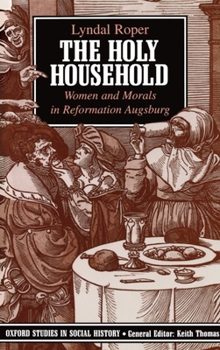The Holy Household: Women and Morals in Reformation Augsburg
Select Format
Select Condition 
Book Overview
This is a fascinating study of the impact of the Reformation idea of "civic righteousness" on the position of women in Augsburg. Roper argues that its development, both as a religious credo and as a social movement, must be understood in terms of gender. Until now the effects of the Reformation on women have been viewed as largely beneficial--Protestantism being linked with the forces of progressivism, individualism, and modernization. Roper here argues that such a view of the Reformation's legacy is a profound misreading, and that the status of women was, in fact, worsened by the Reformation. A number of themes are explored: the economic position of women in the household economy; the nature of "civic righteousness" and how it applied a "reform moralism" to the role of marriage and the household; the efforts of civic authority to reform sexual deviance; the attempts to control marriage and the breakdown of marriage; and the role of convents and nuns. The Holy Household is the first scholarly account of how the Reformation affected half of society. It combines sound application of feminist theory with careful, open-ended archival research to advance our understanding of the Reformation, of feminist history, and of the place of women in modern European society.
Format:Paperback
Language:English
ISBN:0198202806
ISBN13:9780198202806
Release Date:November 1991
Publisher:OUP Oxford
Length:306 Pages
Weight:1.00 lbs.
Dimensions:0.7" x 5.5" x 8.5"
Customer Reviews
1 rating
Wonderfully robust research, muddled support for thesis
Published by Thriftbooks.com User , 20 years ago
In a brief but lucid introduction to her monograph, Lyndal Roper states her argument plainly for the reader. The last sentence of the section reads, "The conservative rewriting of the Reformation movement's message around a politics of women's role in marriage and household was the key to its successful implementation and establishment." Roper's thesis is that evangelical Protestant doctrine conquered Augsburg not because it offered radical social change, but rather because it became a spiritual buttress for traditional gender roles in marriage. This is a departure from the more conventional view of the Reformation, when it was portrayed a more liberating social order for the average woman, at least when compared to the traditional Christianity practiced prior to the sixteenth century. The Holy Household has a straight-forward structure; Roper devotes chapters to analysis of sin, prostitution, wedding rites, expectations of marital relations, and the treatment of Catholic nuns. Roper's analysis of daily life in Augsburg, from the early sixteenth century to about 1550 (the period of the Catholic restoration), is certainly masterful. A staggering list of works cited, both printed and unprinted sources, takes up over twenty pages of the book. The majority of footnotes for particular arguments refer the reader to the mass of primary local and municipal archives Roper sifted through to find support for her thesis. When secondary works are cited, the footnote is usually a brief aside about parallel works, potential counter-arguments, or points of dissension between Roper's case and the traditional study of the Reformation. By making such obvious use of primary sources, Roper lends a great amount of credibility to her research, and at a few points in the book even delves into literary analysis of the use of certain German words during the period. For instance, there is a discussion of the various terms used by the Augsburg Council to describe sin and discipline to citizens. This meticulous investigation into period archives provides an accessible portrait of life in Reformation Augsburg and proves Roper's ability as a researcher. However, does this scholarship prove Roper's thesis? Ultimately, her argument puts the cart before the horse. Copious examples throughout the book illustrate that gender roles and marriage relations became increasingly calcified throughout the period due to the policies of the Protestant government of Augsburg. They founded these beliefs on Biblical tenets, but also on cultural mores extant at the time. The Protestant Reformation hardly liberated women from habitual gender roles and in fact became more patriarchal and sexually repressive as it advanced. This much Roper exhaustively proves. Ignored are other attributes of early modern Augsburg that found vindication in the Reformation, which may do more to explain the movement's success than the power offered to men over women. For example, the erasure of Ca






